 December 2023 in “International journal of research in dermatology”
December 2023 in “International journal of research in dermatology” The ayurvedic hair oil is safe and effective for reducing hair fall, promoting hair growth, and improving scalp health.
 1 citations,
August 2023 in “JAMA Dermatology”
1 citations,
August 2023 in “JAMA Dermatology” Increasing the dose of baricitinib to 4 mg helps more patients with severe alopecia areata regrow hair.

New treatments for hair loss, including a compound called "ALRV5XR", platelet-rich plasma, and Adult Stem Cell-based therapy, are showing promise, but more trials are needed for confirmation.
Topical 5% minoxidil is safe and effective for treating hair loss in Korean men.
2 citations,
September 2022 in “Frontiers in Nutrition” High-dose vitamin D3 does not improve symptoms or quality of life in COVID-19 patients after one year.
 June 2024 in “Advances in therapy”
June 2024 in “Advances in therapy” IVL3001 is safe, effective, and better than oral finasteride for treating hair loss.
 29 citations,
July 2009 in “Journal of Dermatology”
29 citations,
July 2009 in “Journal of Dermatology” 5% minoxidil works better for hair growth than 1% minoxidil.
 20 citations,
January 2002 in “PubMed”
20 citations,
January 2002 in “PubMed” Finasteride 1 mg/day for five years effectively improves hair growth and slows hair loss in men with male pattern baldness, and is safe for long-term use.
 37 citations,
December 2019 in “Giornale italiano di dermatologia e venereologia”
37 citations,
December 2019 in “Giornale italiano di dermatologia e venereologia” The Italian guidelines offer advice for diagnosing and treating alopecia areata based on expert opinion and limited clinical trial evidence.
 April 2018 in “Expert Opinion on Drug Safety”
April 2018 in “Expert Opinion on Drug Safety” Dutasteride is a safe and effective treatment for hair loss.
 1 citations,
February 2004
1 citations,
February 2004 Skin diseases are common and can significantly affect people's lives; better outcome measures and ethical clinical trials are needed to improve dermatology care.
 1 citations,
April 2023 in “American Journal of Clinical Dermatology”
1 citations,
April 2023 in “American Journal of Clinical Dermatology” Chronic telogen effluvium may not be a unique condition and could be confused with other types of hair loss.
 April 2021 in “Journal of Investigative Dermatology”
April 2021 in “Journal of Investigative Dermatology” A trial showed that a new treatment is safe and effective for male pattern baldness, with most participants growing new hair.
 1 citations,
April 2018 in “Journal of Investigative Dermatology”
1 citations,
April 2018 in “Journal of Investigative Dermatology” Tofacitinib helped most patients with alopecia areata regrow hair and changes in immune cells were linked to the treatment's effectiveness.
 December 2023 in “International Journal of Biomedicine”
December 2023 in “International Journal of Biomedicine” Topical finasteride might help with male hair loss with fewer side effects than pills, but more research is needed.
 September 2023 in “Medical & Clinical Case Reports Journal”
September 2023 in “Medical & Clinical Case Reports Journal” Platelet-Rich Plasma (PRP) may increase hair density and thickness in Androgenetic Alopecia, but it's not significantly better than a placebo.
August 2024 in “Nutrients” Probiotics help reduce hair loss and increase hair growth in people with androgenic alopecia.
 159 citations,
October 2015 in “Science Advances”
159 citations,
October 2015 in “Science Advances” Blocking JAK-STAT signaling can lead to hair growth.
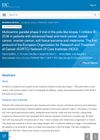 93 citations,
May 2010 in “European Journal of Cancer”
93 citations,
May 2010 in “European Journal of Cancer” BI 2536 had limited effectiveness against several advanced cancers and caused significant side effects.
15 citations,
December 2006 in “Clinical interventions in aging” 5 alpha-reductase inhibitors like finasteride may lower prostate cancer risk and improve cancer screening.
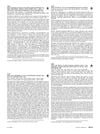 June 2017 in “Journal of The American Academy of Dermatology”
June 2017 in “Journal of The American Academy of Dermatology” The new treatment was safe and may effectively treat male pattern hair loss.
3 citations,
October 2021 in “Clinical, Cosmetic and Investigational Dermatology” Setipiprant did not significantly improve hair growth in men with hair loss.
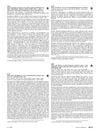 May 2017 in “Journal of The American Academy of Dermatology”
May 2017 in “Journal of The American Academy of Dermatology” The new baby shampoo and wash with stearic acid is safe and potentially effective for nourishing babies' skin.
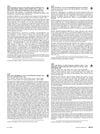 May 2017 in “Journal of The American Academy of Dermatology”
May 2017 in “Journal of The American Academy of Dermatology” The treatment increased hair follicle counts and is potentially effective for male hair loss without serious side effects.
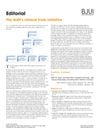 March 2017 in “BJU international”
March 2017 in “BJU international” The BJUI supports clinical trials as key for unbiased medical evidence and works to enhance their design, reporting, and discussion.
 1 citations,
June 2001 in “Annals of Internal Medicine”
1 citations,
June 2001 in “Annals of Internal Medicine” The conclusion is that maintaining blinding in clinical trials is crucial for reliable results.
 3 citations,
November 2022 in “Experimental dermatology”
3 citations,
November 2022 in “Experimental dermatology” Melatonin may inhibit melanoma growth and has potential as a cancer therapy aid, but its effects on human skin pigmentation need more research.
505 citations,
December 2011 in “Journal of clinical oncology” MK-2206 was safe and effectively blocked AKT signaling in cancer patients, warranting more trials.
December 2022 in “Journal of dermatology and skin science” Androgenetic alopecia trials in the U.S. lack racial and ethnic diversity, limiting their applicability.
 35 citations,
August 2004 in “Epilepsy & behavior”
35 citations,
August 2004 in “Epilepsy & behavior” Extended-release divalproex is better tolerated and more effective for seizures and psychiatric symptoms than delayed-release divalproex, but doesn't reduce hair loss.






















